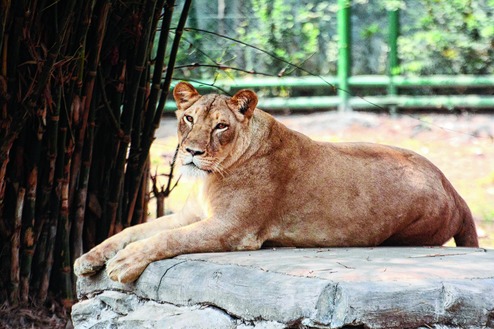
Jamshedpur: Tata zoo vet Manik Palit is coordinating with a panel of wildlife experts to prevent the spread of Babesiosis, an infection that is suspected to have killed two Royal Bengal Tigers here recently.
Palit is consulting experts on the line of treatment and preventive steps to save other animals, especially big cats.
The panel include Dr A.B. Srivastav, retired professor of Jabalpur Veterinary College in Madhya Pradesh, Dr Gaurav Srivastav, veterinary officer of Etawah Safari Park in Uttar Pradesh, Dr B.M. Arora, retired professor of Centre for Wildlife (Indian Veterinary Research Institute) in Bareily, Uttar Pradesh, Dr M. Navin Kumar, retired deputy director of Nehru Zoological Park in Hyderabad, and Dr Nidhi Rajput, associate professor of School of Forensic and Wildlife Medicine at Jabalpur Veterinary College.
Among inputs being sought is the interval between injections and medicine dosage, Tata zoo director Bipul Chakravarty said.
"They are masters in their fields. It is now very vital to work under their guidance," Chakravarty said, but called the situation under control.
"We are awaiting the blood report from Institute of Animal Health and Veterinary Biologicals (IAHVB), Calcutta. We have taken all possible preventive steps to stop spread of Babesiosis. I am sure rest of the big cats are safe," Chakravarty claimed.
A two-member team of Dr Mrityunjay Mandal and Dr Pralay Mandal inspected the zoo on Thursday and collected blood samples of one of the two surviving Bengal tiger cubs, white tiger Kailash, African lion Ed and leopard Ved on Friday. The zoo director said lions, tigers and leopards had been put under continuous observation.
Regular fumigation of all feeding cells and outdoor enclosures of big cats and other animals being carried out besides the installation of flycatchers in feeding cells of the big cats and regular monitoring of vector load on the zoo campus with help from Jusco.
The zoo management is also keeping Central Zoo Authority and the state's chief wildlife warden L.R. Singh updated about the developments.
Bus ban on deer turf
From Sunday, April 1, the small bus offering a tour of the herbivore enclosure at Tata zoo will not ply anymore.
The zoo management's order comes in the wake of a recent CZA directive that bans vehicles to any herbivore enclosure less than 30 hectares. The zoo's herbivore enclosure measures only 3.5 hectares.
The 70 black bucks, nilgais and spotted deer will stay at the enclosure as usual.
Tata zoo director Bipul Chakravarty stressed that utilities company Jusco would soon build an elevated structure for visitors inside the enclosure for a proper aerial view of the deer.










